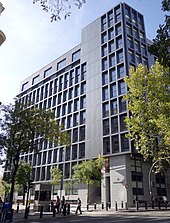Audiencia Nacional de España
The Audiencia Nacional de España ( German National Court of Justice of Spain ) is a high court in Spain that is entrusted with the prosecution of serious crimes, including terrorism ( ETA ). The Audiencia Nacional is based in Madrid (Art. 62 of the Spanish Judiciary Act, Ley del Poder Judicial , LPJ). The Audiencia Nacional has jurisdiction over the whole of Spain. The Audiencia Nacional was established by Decree Law 1/1977 of January 4, 1977 (Journal of Laws No. 4 of January 5, 1977).
Position in the Spanish judiciary and development
The Audiencia Nacional consists of three chambers (Salas) assigned to the fields of criminal law , administrative law and social law , as well as an appeal chamber (Sala de Apelación) for criminal proceedings (Art. 64 LPJ). The individual chambers are subdivided into departments (secciones). At the level of the Audiencia Nacional there is no competence for civil proceedings .
In the course of the Spanish courts, the Audiencia Nacional is on the one hand a court of appeal for judgments and decisions of the Central Investigative Courts (“Juzgados Centrales de Instrucción”) and the Central Criminal Court (“Juzgado Central de lo Penal”) as well as for judgments of the Central Administrative Courts (“Juzgados Centrales de lo Contencioso-Administrativo ”) and, on the other hand, the first instance court for certain, legally regulated cases of particular importance. Furthermore, the above-mentioned Appeals Chamber of the Audiencia Nacional decides in the legally regulated cases on appeals that have been lodged against judgments of the criminal chamber of the Audiencia Nacional. With the establishment of an appeal chamber through Organic Law 19/2003, the Spanish legislature reacted to proceedings before the ECHR against Spain, which were initiated due to the lack of a second factual instance in appeals against judgments of the Audiencia Nacional in criminal matters.
The Audiencia Nacional is located in the hierarchy of the Spanish courts below the Supreme Court (Tribunal Supremo). The latter can override the decisions of the Audiencia Nacional within the scope of its competence.
The investigating judges of the criminal chamber
The Audiencia Nacional includes the investigative judges who assist the criminal division and who initiate and lead the investigation if there is an initial suspicion of a crime falling under the jurisdiction of the criminal division (in particular organized crime and terrorism ). Not least because of the cases they deal with, the investigative judges have a prominent position that is particularly well recognized in the Spanish public and press. Baltasar Garzón , Juan del Olmo and Fernando Grande-Marlaska , for example, are currently active and well-known investigative judges of the Audiencia Nacional .
Competences of the chambers
Criminal Chamber (Sala de lo Penal)
The criminal chamber (Art. 65 LPJ) is responsible for:
- Criminal proceedings of particular importance, in particular crimes against the King, Queen and Prince, state and government organs, counterfeiting and other currency offenses, drug trafficking, cases of organized crime that affect the borders of an autonomous region and those outside Spanish territory crimes committed,
- the further implementation of criminal proceedings initiated abroad, the enforcement of foreign criminal judgments, insofar as Spain is obliged to do so by an international treaty,
- Extradition procedure (passive),
- Appeals against the judgments or decisions of the Central Criminal Court ("Juzgado Centrales de lo Penal", to which some of the case groups named in Art. 65 LPJ are also assigned) and the Central Investigative Courts ("Juzgados Centrales de Instrucción") and the Central Juvenile Court ( "Juzgado Central de Menores")
After the jurisdiction for criminal prosecution in the field of terrorism was withdrawn from military jurisdiction by Decree Law 3/1977 and assigned to the ordinary courts (Central Investigative Courts and Audiencia Nacional), the justification was given in Organic Law 9/1984 of December 26, 1984 the exclusive competence of the Audiencia Nacional for terrorist offenses within the ordinary jurisdiction.
The above-mentioned Central Investigative Courts inform the Criminal Chamber of the Audiencia Nacional or the Central Criminal Court within the scope of their jurisdiction about the facts of the criminal proceedings under trial.
Administrative Chamber (Sala de lo Contencioso-Administrativo)
The Administrative Chamber (Art. 66 LPJ) is responsible for:
- contesting administrative acts of ministers and state secretaries as well as contesting decisions of the commission for the supervision of activities related to the financing of terrorism (all in a single instance),
- Appeals against judgments of the central administrative courts ("Juzgados Centrales de lo Contencioso-Administrativo") in the cases specified by law,
- Challenging contracts between public administration bodies or agencies, insofar as this does not fall within the jurisdiction of the Tribunales Superiores de Justicia existing in the autonomous regions, as well as challenging decisions of the Economic Administrative Court ("Tribunal Económico-Administrativo Central"),
- the decision on the jurisdiction of an administrative court
Social Chamber (Sala de lo Social)
The social chamber (Art. 67 LPJ) is the only instance responsible for:
- Proceedings which have as their object the challenge of a collective agreement, the scope of which extends beyond the territory of an autonomous region,
- Decisions in disputes in the field of collective labor law, insofar as the settlement of these affects more than one autonomous region
